Exploring the Complex Relationship with C++: Love and Challenges

C++ has a storied history in the programming world, evolving since its inception in 1985. The language, created by Bjarne Stroustrup, was designed as an enhancement over C, adding features like object-oriented programming (OOP) and a more streamlined syntax. As developers reflect on their experiences with C++, many express a mix of admiration and frustration, highlighting both its strengths and weaknesses.
My journey with C++ began in the 1990s, during a time when I was still learning the basics of programming with languages like Visual Basic and JavaScript. While the first formal standard for C++ was established in the ISO 1998 standard, its evolution had been underway for years. The language offered free tooling options, such as the g++ compiler on the GNU Compiler Collection (GCC), making it accessible for many budding developers.
Despite its initial complexity, C++ revealed its true potential as I progressed. A pivotal moment came when I read Stroustrup’s The C++ Programming Language, which not only clarified the fundamentals but also provided insights into structuring code effectively. This resource became invaluable as I transitioned from simple scripts to more complex applications.
Challenges and Complexities in C++ Development
As I delved deeper into C++, I encountered a myriad of challenges that would test my skills. The issues with header file organization and linking order often led to frustrating circular dependencies. The preprocessor’s simplistic approach to handling header files exacerbated these problems, creating a mix of chaos and confusion in code management. Tools like GCC offer flags to help diagnose these issues, but they reveal just how intricate and unwieldy the language can become.
The introduction of C++11 marked a significant milestone, bringing several enhancements to the language. However, many core issues remained unresolved. The “Static Initialization Order Fiasco” is one such example, where the initialization order of static variables can lead to unpredictable behavior. Developers must take care to manage initialization explicitly to avoid runtime errors, a lesson I learned the hard way during my work on the NymphRPC project.
Further complicating matters is the lack of significant improvements to the Standard Template Library (STL). While C++11 introduced much-needed multithreading support, the complexities associated with condition variables and the Filesystem library added layers of difficulty. Many developers, myself included, have found alternative libraries, such as the POCO C++ libraries, to be more user-friendly and efficient.
The Future of C++: A Mixed Bag
Despite my frustrations, C++ remains an integral part of my programming toolkit. The language’s flexibility allows developers to choose their preferred paradigms, but this freedom can also lead to poor decision-making. As C++ continues to evolve, I find myself longing for more significant changes that address fundamental issues, particularly in areas like string handling and initialization behaviors.
The recent trends in programming languages, particularly with the rise of Ada, have prompted me to explore alternatives. Ada offers a strong type system and robust error checking, features that C++ struggles to implement effectively. This exploration has fostered a sense of nostalgia for the simplicity and reliability of languages that prioritize developer experience.
As I reflect on my relationship with C++, I recognize the complexity inherent in programming. The journey is marked by both triumphs and challenges, with each experience shaping my understanding of the language. While I may grumble about new features that seem unnecessary, I acknowledge that growth requires adaptation and a willingness to embrace change.
In the end, C++ remains a powerful tool for developers, one that demands respect and understanding. As I continue to engage with the language, I hold out hope for future improvements that will bridge the gap between practical application and academic advancement, fostering a more harmonious relationship between developers and the language we have come to know so well.





